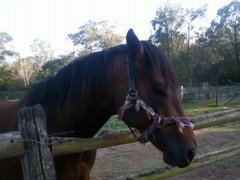There are people who seem to think that horses can be treated as equals or as "friends". This is probably the basis of "Natural Horsemanship" and such like. This is also a formula for problems with your horse. Unless the horse has a clear view of the need to submit to humans, you are asking for problems.
In a herd situation, if a stallion senses danger and alerts his mares, he isn't going to tolerate a mare who is going to stop and argue the point with him. He is going to nip and kick her to submission. An alpha mare is not going to tolerate a junior horse interferring with her decision to move the herd to better grazing. It is not in the interest of the herd. She will kick that other horse or will cast it out to be fair game for predators rather than endanger the herd. So a horse needs a clear line of submission or its life will be in danger.
Like wise under domestication. The horse needs a clear line of submission or it will be in danger and it will put you in danger at the same time. Whether you like it or not, if you do not get full cooperative submission from your horse, it will take the initiative itself. Being an animal in a dangerous situation, it will take the only way it knows - run away! And what will be the result of that?
Using the word "submission" sounds very forceful and intolerant. But being wishywashy about it isn't going to help your horse. He needs a strong line of command or he is left with no choice but to take it himself. If you are weak, a horse will sense it. A good horse will try to protect you at the same time if it senses danger, and particularly if it is a male horse - even a gelding. However, it will have no respect for you and you will have a hard time convincing him it was a one off mistake on your part.
So while it seems a harsh thing to get your horse to submit to you, it really is a safety issue, both from the horse's point of view and your own.
I am not advocating beating the crap out of your horse and getting him to give in to your superior strength. I am advocating putting limits onto him. Learning to say "No" and being prepared to enforce it with a responding action, a slap, for example, or making him back up, anything to make him do what he is supposed to do. And then making him do it. This means teaching him to not be spooky of things and I have talked about bombproofing elsewhere. This means if you ask him to walk through a puddle of water, you let him learn that he wont drown in it and can cross it in one lesson. It means he learns not to attack you when you go to give him his dinner at night. And so on.
With foals, you teach them right from the beginning, that yes, Mum is there, but neither of you are going to die if you can't reach her for a moment because I am holding you. You tie them up at a few days old, so that if they need veterinary care they can be handled, and later farriered and dental work done. It is somewhat harsh to start off with, but with a good start, you have a respectful horse and a safe horse.
This morning, my mare came up to me for a carrot. She let me pat her and scratch her and brush her mane. Then I started stroking her ears. Her head just drooped and sagged. She was so enjoying her attention. But later on today, I thought she had cut herself, and I took hold of her halter and made her stand up so I could check her out. She did not fuss or pull away, she knew I meant business. I did not have to hit her or shout or pull her around. She is happy knowing I am in charge, and I am happy knowing she is doing what I want so I can inspect her quickly. Luckily she just had some mud and petals on her leg and nothing else. She is an ex-racehorse and she still has some issues, but as time goes by, she is becoming the horse she should be and she is quite happy about it.
There are many ways into a horse's mind and heart, these are some of my ideas ...
Saturday, September 15, 2007
Subscribe to:
Post Comments (Atom)


No comments:
Post a Comment